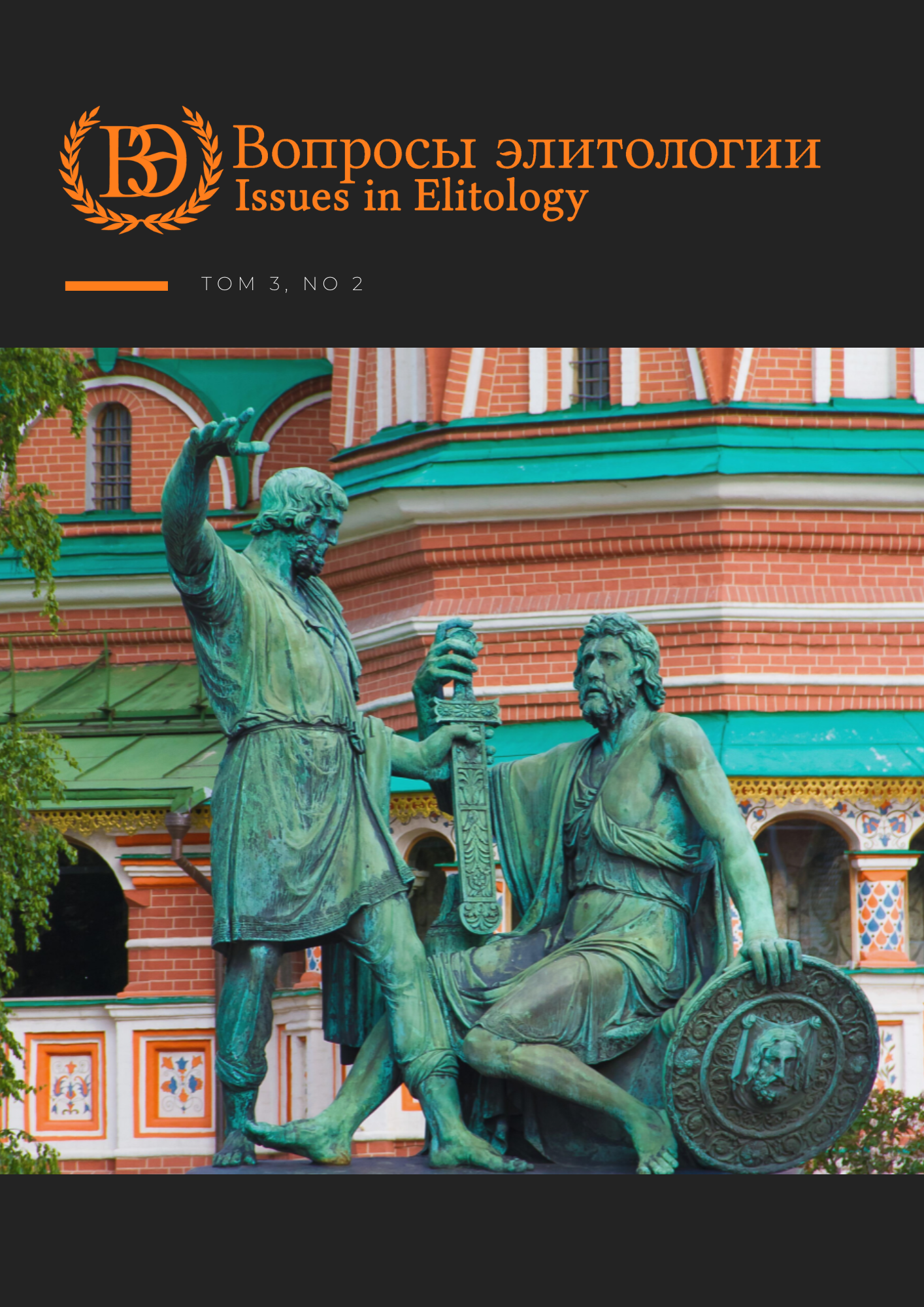Abstract
Modern political elites are experiencing very dramatic changes associated with the transformation of their traditional codes of behavior, which were worked out in the era of a developed industrial society. However, the more frequent crises (2008 and 2022) indicate that the world of elites is faced with a serious choice - proven methods of professional activity no longer work, and personnel competence is insufficient to objectively assess and make adequate decisions. The crisis has already affected such fundamental foundations of the world order as democratic institutions and national security. Failure of functioning in these areas is fraught with serious reputational and socio-political losses. Added to this was the conflict of values and meanings. As a result, the motivation of their behavior began to change in power structures, and in the selection of elites, there was not just an obvious stagnation, but a real personnel crisis, threatening the loss of basic professional competencies. However, the growing threat of a global systemic crisis is not felt by the ruling elites, who do nothing to prevent it and continue to pursue their usual pre-crisis policy. They will no longer succeed in ignoring objective reality in this way. Sooner or later there will come a «moment of truth» when they will have to face the truth. The present work is devoted to the analysis of this problem.
References
Altawil F.A. (2017). Transformation of Political Regimes in Egypt and Libya in the «Arab Spring»: A Comparative Analysis (Issue 1). Politics, Economics, Law. (In Russian).
Amurov M.A. (2020). Typology of modern political elites. Management Consulting, 5 (137). doi: 10.22394/1726-1139-2020-5-19-28 (In Russian).
Arceneaux K., Dunaway J., & Soroka S. (2018). Elites are people, too: The effects of threat sensitivity on policymakers’ spending priorities. PloS One, 13(4). doi: 10.1371/journal.pone.0193781
Bahardoost P., Tavassoli Roknabadi M., & Erfanmanesh M. (2019). The Role of Political Elite Relations in the Elites Circulation. IAU Interna-Tional Journal of Social Sciences, 9(2).
Best, H. (2010). Democratic Elitism: New Theoretical and Comparative Perspectives (J. Higley, Ред.; 3rd pub.). Brill.
Boyko S.I. (2018). Political ambivalence of elites as the capital of revolution. Humanities. Vestnik finansovogo universiteta, 2(32). doi: 10.26794/2226-7867-2018-8-2-31-36 (In Russian)
Dahl, R. A. (1956). Preface to Democratic Theory. University of Chicago Press.
Duca A.V. (2015). Fundamentals of power elites functioning. Power and Elites. (In Russian).
Gaman-Golutvina, O. (2018). Political Elites in the USA under George W. Bush and Barack Obama: Structure and International Politics (V. 43, Issue 4). Historical Social Research/ Historische Sozial for schung. doi: 10.12759/hsr.43.2018.4.141-163
Gewirtz, J. (2020). China Thinks America is Losing. - Foreign Af-Fairs, 99(6), 62–72.
Gorskaya A.N. (2018). Basic approaches to the study of elites and the possibilities of their application to the analysis of the local level of power and governance-Contentus (Issue 5 (70)). (In Russian).
Grigoryan D.K., Kritskaya A.A., Ayrapetyan D.A., & Verenich I.G. (2020). Ruling elite of foreign countries and its role in geopolitical communications of modernity. Communicology. doi: 10.21453/2311-3065-2020-8-1-63-73 (In Russian).
Higley, J. (2006). Elite Foundations of Liberal Democracy (edition): Rowman& Littlefield.
Higley, J. (2018). Continuities and discontinuities in elite theory—The Palgrave Handbook of political elites. Palgrave Macmillan. doi: 10.1057/978-1-137-51904-7_4
Komkova S.S. (2018). Political elites in Central Asian states: Common features and radical differences. Archont, 2 (5). (In Russian).
Kozhemyak N.S. (2018). The policy of H. Assad’s government towards the Druze community in Syria: Political and ideological aspects (Issue 4 (38)). Bulletin of the Belarusian State University. (In Russian).
Lanko D.A. (2012). Geopolitics of Eurasia in the representation of political elites. Eurasian Integration: Economics, Law, Politics, 11. (In Russian).
Maximova E.N. (2021). Political elites as a factor of political system instability—Voprosy elitologii (Issue 4). (In Russian).
Mishurina O.V., Selina V.A., & Chartia D.G. (2017). Peculiarities of re-twisting of political elites in conditions of geopolitical integration. Eura-Sian Scientific Journal, 2. (In Russian).
Nefedov S.A. & Kutsaenko E.I. (2019). Political elite and its informational privileges. Modern Science and Innovations, 3(27). doi: 10.33236/2307-910X-2019-3-27-157-165 (In Russian).
Pareto, V. (1963). The Mind and Society: A Treatise on General Sociology (1st pub.). Dover.
Petrecka, B. (2021). Selected theoretical concepts of the social elite. Humanities and Social Sciences, 28(3). doi: 10.7862/rz.2021.hss.23
Rathkolb O. & Ogris G (Ed.). (2010). Authoritarianism, History and Democratic Dispositions in Austria, Poland, Hungary and the Czech Republic. Studienverlag.
Ricart-Huguet, J. (2019). The historical turn in the comparative study of political elites (Issue 29(2)). Newsletter of the Organized Section in Comparative Politics of the American Political Science Association.
Rodionov M.A. (2017). Information technologies and modern political elites. Socio-humanitarian knowledge, 1. (In Russian).
Rodrıguez-Teruel J. & Daloz J.P. (2018). Surveying and observing political elites. In The Palgrave Handbook of Political Elites.
Romanov S.Y. (2018). Mechanisms of party recruitment and selection of elites and leaders in Great Britain and the USA - Science through the prism of time (Issue 4 (13)). (In Russian).
Samusevich A.V. (2018). The ratio of political and administrative elite: To the question of the content of concepts. Vestnik PAGS, 3. doi: 10.22394/1682-2358-2018-3-122-129 (In Russian).
Shetyakova A.V. (2015). Permeability of Recruitment Channels in the Political Elite (Выпуск 3). Vestnik (Herald) of Saint Petersburg University. Politology. International relations.
Tambiyants Y.G. & Shalin V.V. (2018). Phenomenon of political elite: Problematics of determination of social essence. Society and Law, 4 (66). (In Russian).
Titova L.G. & Titova O.N. (2019). Political elite in the era of trans-formation. Socio-Political Research, 1. doi: 10.24411/2658-428X-2019-10335 (In Russian).
Tocqueville, A. (1897). Democracy in America (1st pub.). Library Fund. (In Russian).

This work is licensed under a Creative Commons Attribution 4.0 International License.


